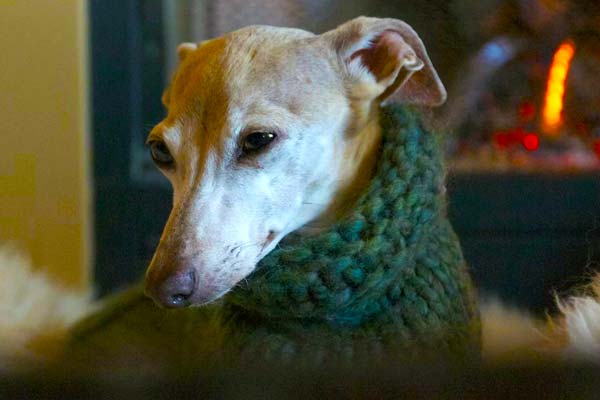Do Italian Greyhounds Bark a Lot? An Expert Analysis
Italian Greyhounds are a small, delicate dog breed known for their affectionate and playful nature. However, many people wonder if these dogs bark a lot. The answer is complex, as it can vary from dog to dog.
Like all dogs, Italian Greyhounds may bark for a variety of reasons. They could be signs of danger, excitement, or anxiety to their owners. They may also bark as a form of communication, such as to get attention or to express boredom. However, some Italian Greyhounds may bark excessively, which can be problematic for their owners and neighbors.
It is important to note that excessive barking is not a breed-specific trait and can be influenced by various factors, including the dog’s personality, training, and environment.
Understanding Italian Greyhounds
Italian Greyhounds, also known as “IGs” or “Iggies,” are a small dog breed originating from Italy. They are known for their sleek, graceful appearance and gentle nature. Here are some key characteristics of Italian Greyhounds:
Breed Characteristics
| Characteristic | Description |
|---|---|
| Size | Extra small |
| Coat | Short, smooth, and glossy |
| Color | Grey, sable, red, black, cream, and blue |
| Height | 13-15 inches |
| Weight | 7-14 pounds |
| Lifespan | 12-15 years |
Temperament Traits
Italian Greyhounds are famous for their affectionate and loyal nature. They are polite and peaceful with everyone and are not known to bark excessively. However, they can be shy if they need to be socialized enough. They are spirited hunters and bark when they see rabbits or similar game.
Historical Background
Italian Greyhounds have existed for centuries and were initially bred in Italy as companion dogs. They were also used for hunting small game such as rabbits. Over time, they became popular among royalty and were often seen in paintings and other works of art.
Origin and Purpose
The exact origin of Italian Greyhounds is unknown, but they are believed to be descended from ancient Egyptian and Roman sighthounds. They were bred to be companion dogs and were often kept by royalty and the wealthy.
Evolution of the Breed’s Traits
Over time, Italian Greyhounds have evolved to become smaller and more refined. They were once larger and used for hunting, but their size was gradually reduced to make them better suited for life as companion dogs. Their sleek and graceful appearance has also become more pronounced over time.

Factors Influencing Barking Behavior
Barking is a natural dog behavior, and Italian Greyhounds are no exception. However, the amount of barking can vary depending on several factors. Understanding these factors can help owners manage their dog’s barking behavior.
Instinctual Nature
Italian Greyhounds have a strong hunting instinct, which can lead to barking when they see or hear prey. This instinct can also cause them to bark at unfamiliar people or animals, as they may perceive them as a potential threat.
Additionally, Italian Greyhounds have a guarding behavior that can lead to barking when they feel their territory is being invaded.
Socialization
Socialization plays a significant role in a dog’s barking behavior. Proper socialization can help Italian Greyhounds become more comfortable around people and other animals, reducing their tendency to bark. On the other hand, a lack of socialization can cause fear and anxiety, leading to excessive barking.
Interaction with humans can also influence barking behavior. If Italian Greyhounds receive attention or rewards for barking, they may continue to do so to get what they want. It’s essential to train Italian Greyhounds to understand when barking is appropriate and when it’s not.
Environmental Stimuli
The home environment can also affect barking behavior. If Italian Greyhounds are left alone for long periods or are not given enough exercise, they may become bored and bark out of frustration.
Ensuring they receive enough physical activity and mental stimulation can make a significant difference in addressing this concern.
External triggers, such as loud noises or other animals, can cause Italian Greyhounds to bark. It’s essential to identify these triggers and work to desensitize the dog to them. This can be done through training and exposure to the trigger in a controlled environment.
Barking Patterns in Italian Greyhounds
Italian Greyhounds, often called the “silent sentinels,” are known for their quiet demeanor. However, like all dogs, they may bark in certain situations.
Understanding their barking patterns can help owners better communicate with their furry companions and address any issues that may arise.
General Barking Behavior
Italian Greyhounds are not excessive barkers but may bark for various reasons. Some common triggers include attention-seeking, feeling anxious or stressed, or when someone approaches the home.
It’s essential to note that each dog is an individual and may have different barking tendencies depending on their training, socialization, and environment.
Specific Scenarios
When Someone Approaches The Home
Italian Greyhounds may bark when someone approaches their home, but they are not known for being aggressive. They may bark to alert their owners or out of curiosity.
Training them to stop barking is essential once the owner acknowledges the visitor and rewards them for their excellent behavior.
During Playtime
Italian Greyhounds may bark during playtime, especially if they are excited or want attention. It’s essential to redirect their behavior by engaging them in a different activity or rewarding them for good behavior during playtime.
When Feeling Anxious or Stressed
Italian Greyhounds may bark when they feel anxious or stressed. It’s crucial to pinpoint the source of their unease and respond appropriately.
Creating a safe and stable setting, ensuring they get regular exercise, and offering mental stimulation can effectively alleviate their stress.
Other Common Triggers
Other common triggers that may cause Italian Greyhounds to bark include boredom, hunger, or discomfort. It is essential to address these issues and provide them with the necessary resources to prevent excessive barking.

Comparing Barking Habits with Other Dog Breeds
Italian Greyhounds, or Iggies, are small dogs originating from Italy. One of the most frequently asked questions about Italian Greyhounds is whether or not they bark a lot.
While they are not known for excessive barking, it is essential to understand their barking habits compared to other dog breeds.
Italian Greyhounds vs. Other Breeds
Compared to other dog breeds, Italian Greyhounds are relatively quiet. They are known for their discerning quietness and are often called the “silent sentinels.” They tend to bark occasionally, but their barking is generally not excessive.
On the other hand, some dog breeds are known for their excessive barking. For example, the Beagle and the Chihuahua bark a lot.
Beagles are hunting dogs and use their barking to alert their owners of prey, while Chihuahuas have a reputation for being yappy and barking at everything.
Breed-Specific Traits
Barking habits can vary significantly depending on the breed-specific traits. For example, some breeds are more territorial and protective, which can lead to excessive barking. Other breeds, like Italian Greyhounds, are more laid-back and less prone to barking.
It is also essential to consider the individual dog’s personality and temperament. Some Italian Greyhounds may be more vocal than others, depending on their personality and surroundings.
Common Misconceptions
There is a common misconception that small dog breeds bark more than larger breeds. However, this is only sometimes the case. While some small breeds are known for excessive barking, many larger breeds can also bark excessively.
Another common misconception is that barking is always a bad thing. Barking is a natural behavior for dogs and can be essential for communicating.
However, excessive barking can be a problem and may indicate underlying issues that must be addressed.
Managing and Training Techniques
Italian Greyhounds can be trained not to bark excessively with the right techniques. Here are some effective management and training techniques that can help reduce barking:
Positive Reinforcement, Reward-Based Training, Consistency in Commands
To stop Italian Greyhounds from barking too much, praise and reward them when they are quiet. It works!
Consistency in commands is also crucial in training the dog to understand what is expected of them.
When the dog barks excessively, avoiding shouting or punishing them is crucial. Instead, reward them with treats or praise when they stop barking.
As time passes, the dog will learn that barking is not rewarded, and they will bark less frequently.
Socialization Strategies, Exposure to Various Stimuli, Controlled Social Interactions
Socialization strategies and exposure to various stimuli can help reduce anxiety and stress in Italian Greyhounds, which can lead to excessive barking. Controlled social interactions with other dogs and people can also help the dog learn appropriate behavior.
Owners can expose their dogs to different sights, sounds, and smells to help desensitize them to new experiences. This can help reduce anxiety and fear, leading to less barking.
Professional Training Services, Benefits of Professional Guidance, When to Seek Professional Help
Professional training services can benefit owners struggling to manage their Italian Greyhound’s excessive barking.
Professional trainers can guide effective training techniques and help owners identify the underlying causes of excessive barking.
Owners should seek professional help if their Italian Greyhound’s excessive barking is causing significant disruption to their daily lives or if they cannot manage the behavior independently.
Tips for Barking Behavior Management
Italian Greyhounds may bark occasionally, but excessive barking can be a problem. Here are some tips for managing barking behavior in Italian Greyhounds:
Creating a Stimulating Environment
Italian Greyhounds are intelligent dogs and require mental stimulation to prevent boredom. Boredom can lead to excessive barking. Owners can provide mental stimulation by providing toys, puzzles, and games that challenge their dog’s mind.
Mental Stimulation Activities
In addition to toys and games, owners can provide mental stimulation by teaching their dogs new tricks and commands. This provides mental stimulation and strengthens the bond between owner and dog.
Adequate Physical Exercise
Italian Greyhounds are active dogs and require daily exercise to prevent boredom and reduce barking. Owners should provide their dogs adequate physical exercise, such as daily walks or runs in a safe and enclosed area.
Establishing Routine
Establishing a routine is vital for Italian Greyhounds. A consistent feeding and walking schedule can help prevent excessive barking. Owners should also establish bedtime and quiet hours to help their dogs relax and reduce barking.
Consistent Feeding and Walking Schedule
Owners should establish a consistent feeding and walking schedule for their Italian Greyhounds. Regular feeding times can help prevent hunger-related barking, while regular walks can provide the physical exercise and mental stimulation needed to avoid boredom and reduce barking.
Bedtime and Quiet Hours
Owners should establish bedtime and quiet hours for their Italian Greyhounds. This can help reduce barking during the night and ensure that their dog gets adequate rest. Providing a comfortable and quiet sleeping area can also help reduce barking.
Common Mistakes to Avoid
When it comes to training Italian Greyhounds to bark less, there are some common mistakes that owners should avoid. Punishment-based training is not effective and can make the problem worse.
Using positive reinforcement techniques instead, such as giving treats and praise when the dog is quiet, is essential.
Inconsistency in commands is another mistake that can lead to increased barking. If different family members give conflicting commands, the dog will become confused and may bark more. Everyone in the household must use the same commands consistently.
Ignoring socialization needs is also a common mistake, leading to increased barking. Italian Greyhounds are social animals and must be exposed to different people, animals, and environments from a young age. They may become fearful or anxious if not correctly socialized, leading to increased barking.






